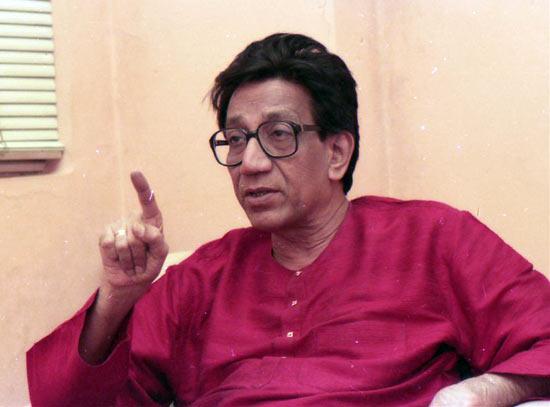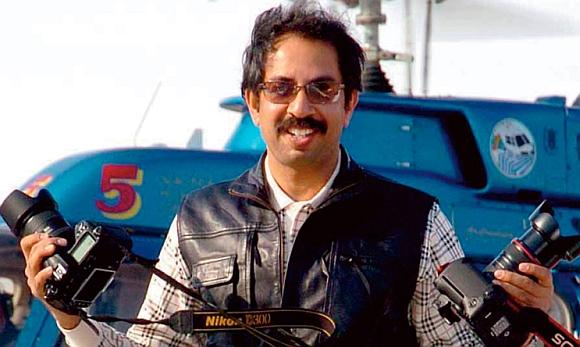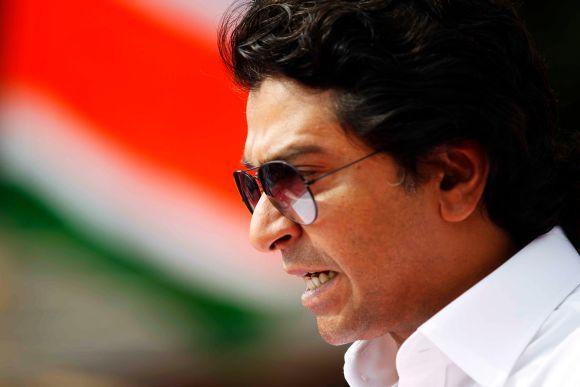 | « Back to article | Print this article |
Will the Sena survive without Balasaheb's charishma?
Will Uddhav Thackeray manage to hold the Shiv Sena together without his charismatic father? And what will his maverick cousin Raj do?
At around 1 am on Tuesday, workers quietly began to dismantle the memorial that had come up on one corner of Shivaji Park at Dadar in Mumbai for Bal Thackeray, the Shiv Sena founder who died on November 17.
The Congress-Nationalist Congress Party government had wanted it removed from the city's best-known public space, while Sainiks, as Shiv Sena workers call themselves, were adamant that the memorial would stay there. Till midnight, bhajans were being sung at the memorial.
Then, all of a sudden, it was put under green scaffolds. An excavator was pressed into service. By 8 am, everything had been removed, and the diya (flame) immersed in the sea at Dadar.
When Balasaheb was alive, the Shiv Sena seldom backed off from a confrontation. In fact, it thrived on whipping up passions over emotive issue concerning Marathi asmita (pride). So, does the recent climb down reflect a newer face of the party which is now led by Balasaheb's son, 52-year-old Uddhav Thackeray?
To be sure, Uddhav is not all fire and brimstone. He is a keen photographer, the author of Maharashtra Desha, a coffee table book which depicts the state's cultural heritage trough aerial shots. Those who have seen Uddhav's photography say his work is quite good and innovative. In other words, there is a softer side to him.
The decision to remove the memorial was a strategic retreat. The state government was ready to go to the courts and the Shiv Sena knew that an eviction order was inevitable. That would have been a serious loss of face. So, the party removed the structure on its own.
Besides, Uddhav and the Shiv Sena need to build bridges with the people of Dadar. Uddhav's estranged cousin, Raj Thackeray, 44, stays here. This is his stronghold. In the 2012 civic body elections, not one Shiv Sena candidate won from Dadar.
All were defeated by Raj's Maharashtra Navnirman Sena. And Raj was opposed to the memorial. Uddhav's insistence on the memorial would have strengthened Raj's hold over Dadar. Uddhav, understandably, didn't stretch the issue too far.
This could be the beginning of a new era for the Shiv Sena which has so far survived on hyperbole, xenophobia, confrontation and muscle power. That's because Uddhav is different from his father. He lacks Balasaheb's charisma and sharp tongue. Balasaheb could get away with his openly contradictory actions.
One moment he would swear that he wouldn't let Pakistan play cricket in Mumbai; another moment he would host Javed Miandad at home. All his life he ridiculed the Congress for dynastic rule, yet thought nothing of hoisting his son and grandson to the top of his own party.
This was not dynastic rule, Balasaheb had said, but family tradition! Uddhav lacks the X-factor to do all this and still have a loyal band of followers. Balasaheb had close friends across the political spectrum: Sharad Pawar, Lal Krishna Advani, George Fernandes et al. Not Uddhav.
Uddhav knows this, perhaps. That's why he has declined to be named Sena Pramukh, unlike his father. There is no campaign to call him Hindu Hriday Samrat (the king of Hindu hearts) by the Sainiks after Balasaheb's death. Some people say he is keen that people don't see him as a carbon copy of his father.
This would also differentiate him from Raj. Uddhav's experiments with the new positioning for the party and himself will be tested soon, in the elections to the Maharashtra assembly in 2014. The sympathy wave generated by Balasaheb's death would have exhausted by then.
"Uddhav has been on the scene for long but in this new capacity he will have to make extra efforts for the party's growth," says Satish Pradhan, who was Shiv Sena's first chief of the erstwhile Thane municipality in 1974 and also the first mayor of Mumbai Municipal Corporation in 1986.
Click NEXT to read further...
Uddhav is not all fire and brimstone
Matoshree is a three-storey bungalow situated in the Kala Nagar housing society of Bandra. Uddhav resides here with his wife, Rashmi, sons Aditya and Tejas, and Balasaheb's manservant, Thapa, who is like family. It is a high-security zone, though after Balasaheb's death the police cover has been relaxed a bit: while his father was given the highest Z-category security by the state, Uddhav gets Y-category cover.
From Matoshree, Uddhav has been confabulating with party workers, leaders and his father's trusted aides.
The old guard includes former chief minister and Lok Sabha speaker Manohar Joshi; party's leader in the state assembly Subhash Desai; former minister and current legislator Dawakar Raote; former ministers Leeladhar Dake and Gajanan Kirtikar; party Member of Parliament and spokesman Sanjay Raut, who is also the executive editor of Shiv Sena mouthpiece Saamna; party legislator Anil Parab; and party spokesman and legislator Neelam Gorhe.
It is, in all probability, on their advice that earlier this month Uddhav held meetings with party workers in all the five regions of the state (Vidarbha, Marathwada, North Maharashtra, Konkan and West Maharashtra). Workers were anxious after Balasaheb's death. These meetings were essential to lift their morale.
Uddhav would fly to each destination in the morning, address party workers during the day, and return to Mumbai at night. On each meeting, he was accompanied by Rashmi and Aditya. Next on the cards is a huge rally in each region of the state sometime in January.
So far, Uddhav has said nothing that indicates that he may dilute Balasaheb's ultra-right stance on various issues. "According to Balasaheb's wish, we shall definitely unfurl the saffron flag atop Mantralaya [the state secretariat], ensure the progress of the Marathi manoos and Hindus, and regain Maharashtra's rapidly depleting glory," Uddhav said at one of his recent meetings with party workers.
Thus, he wants work permits to be issued to North Indians who come to Mumbai so that their influx can be controlled. Shiv Sena had raised the issue when the National Democratic Alliance, led by Bharatiya Janata Party, was in power at the centre (1998 to 2004) but nothing came out of it.
Uddhav reiterated the demand in August after the Amar Jawan memorial in the city was vandalised allegedly by miscreants from Bihar. "The Bihar chief minister should have felt ashamed that the vandal turned out to be a Bihari. If the Mumbai police needs the Bihar police's approval to arrest criminals who have committed crime in Maharashtra and escaped to Bihar, then implement the permit system for those coming from Bihar," he had said.
This should be seen as a calculated move to wean away the hardliners from Raj whose party has been at the forefront of the anti-Northerners campaign. A lot of observers find Raj more similar to Balasaheb, complete with his rabblerousing speeches, brooding eyes and maverick touch.
He showed up at the hospital when Uddhav was undergoing a surgery and later drove him back to Matoshree. He visited Matoshree frequently during his uncle's illness. At Balasaheb's funeral, Raj was seen shedding copious tears, though some news reports said he was sidelined and left abruptly.
Not for nothing do senior BJP leaders as well as workers in Shiv Sena Bhawan, the party's headquarters in Dadar, want Uddhav and Raj to come together in a mahayuti, or grand alliance. The MNS has eaten into Shiv Sena's vote bank. That has hurt Shiv Sena, and its ally, the BJP.
The Shiv Sena came fourth in the 2009 assembly elections with 46 seats (in the house of 288) while the BJP came third with 47 seats. (The Congress was the biggest party with 82 seats, while the NCP was second with 62 seats.) So far, Raj hasn't spoken on the subject. But he has turned down all proposals to share seats with Shiv Sena in elections. "Time is the only remedy and we are prepared to wait," says Pradhan.
Click NEXT to read further...
The MNS has eaten into Shiv Sena's vote bank
Where would the grand alliance, if it happens, leave Aditya? He had shot into fame in October 2010 after he, then 20, had led an agitation in Mumbai University to ban Rohinton Mistry's 1991 novel, Such a Long Journey, which he said portrayed Shiv Sena negatively and was obscene in parts.
Aditya reportedly discussed the book's objectionable elements with fellow students at St Xavier's College, affiliated to Mumbai University, which triggered the protest. Subsequently, the university's vice-chancellor used emergency powers to pull the book off the syllabus, four years after it was included.
Liberals were aghast, but counter-demonstrations by faculty and students to reinstate Mistry's book bore no fruit. For hardliners, Aditya had announced his arrival. Uddhav had played down the incident. Aditya, he had said, was studying law and, therefore, it was natural for him to take up such public issues.
Aditya was appointed chief of Shiv Sena's youth brigade that same year. It had raised eyebrows within the party and outside.
Aditya's younger brother, Tejas, is in college. When Aditya was anointed, Balasaheb had said that Tejas could join his brother in the coming years. Behind the scene, Rashmi, Uddhav's wife, has been the real force to reckon with. After Balasaheb's wife, Meenatai, who was popularly known as Maa Saheb, died in 1996, Rashmi quietly played a crucial role in keeping the family intact.
She is seen as a problem solver not only for the family but also for the party. Several leaders informally discuss various issues with her. However, Rashmi has time and again denied her desire to take up any party post.
Smita Thackeray, the estranged wife of Balasaheb's second son, Jaidev, came into prominence during the Shiv Sena-BJP government in the state (1995 to 1999) when she called the shots on political as well as governance issues. She is now into film production and anti-AIDS activism.
But Smita has never openly expressed her desire to take up any major responsibility in the party. Incidentally, Smita never accepted Uddhav's leadership and attempted in vain to join the Congress. With no response from the Congress, Smita is believed to have shelved her political plans and is happy to work on her business.
Another daughter-in-law, Madhavi, wife of the late Bindumadhav, has never been attracted to politics -- she prefers to keep a low profile and care for her family.
Balasaheb had built a second rung of leadership in the party by offering them the honorific Shiv Sena Neta. Many of them worked with dedication for the party over the years. Uddhav will have to take the help of these senior leaders, but at the same time develop his own A-team.
Of the party's 46 legislators, 27 are first-timers who have been elected from rural Maharashtra, the 7hiv Sena's citadel. However, there is a widening rift between the legislators and party office bearers who come from urban areas. Gajanan Kirtikar, Shiv Sena leader and former minister, believes that "Uddhav is a balanced leader and can help the party grow."
But he cautions that Uddhav will have to be tough against those who violate party discipline. Dissidence has taken a heavy toll on Shiv Sena in the past. Chhagan Bhujbal, the powerful leader of the backward community, left in 1991 to join the Congress.
In 2005, party MP Sanjay Nirupam, who was the non-Marathi face of Shiv Sena, left. He was followed by Narayan Rane, another powerful leader. Subsequently, Raj left and floated the MNS.
To be a hugely charismatic man's son and successor is not easy.
TOP photo features of the week
Click on MORE to see another set of PHOTO features...



